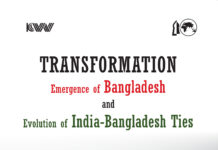Faisal Rahim
There is a growing apprehension that the country is moving towards a no return position. The uncertainty and violence which sparked from the protesting Shahbag youths from February 5 demanding death to Jamaat leaders further aggravated with the death verdict to Maulana Delwar Hossain Sayeede on February 28.
The International Crime Tribunal-1 (ICT) awarded the verdict; but in the process the country has plunged into a critical state of chaos and confrontation between Jamaat workers and Awami League-led government in one hand, and broadly speaking between the secularists and Islamist camps on the other.
The nation witnessed bloody clashes last Friday after Juma prayers in the capital and all over the country when devotees took to the streets to protest what the religious leaders termed as the “insult on Prophet Mohammd (SM) and the holy book Quran by atheists and by enemies of Islam”. Several people were killed in police firing on that day in some districts.
A coalition of Islamic parties has also given the call for this Friday’s (today) agitation in the city and all over the country to voice similar protest and there is a fear of bloody clashes in every body’s mind similar to last Friday’s. The government has already announced that the northern gate of Baitul Mukarram Mosque will remain closed today and the devotees have been asked to enter the Mosque using the eastern and southern gates. This is bound to add further tension to existing confrontation in the streets.
The fights in the streets may further aggravate now when Shibir men are taking to the streets and engaging with police on sudden hit and run tactics.
People fear the spread of bloodshed and lawlessness may take a new turn now after the Sayeede verdict; and then after every other verdict of Jamaat leaders now at the closing of their trial. It may thus push the country to greater destabilization and chaos.
Over 30 people died in the latest spate of violence alone during the last week, mostly in the districts where the fights are now spreading and the Indian press has already dubbed it as the spread of civil war to countryside.
The leaders of the Shahbag protest made no secret that they are working on a cleansing campaign to root out Jamaat from the country along with its banking and other businesses. It means the fear of confrontation may be longer and also unpredictable in many cases.
But the question is why the nation is moving towards this bloody confrontation without taking into consideration its wider ramifications. Will it allow the private sector to grow and economy to prosper? Will there be more local and foreign investment; how will the socio-economic changes which are sweeping the nation over the past decade continue and where the resource will come from to turn Bangladesh a middle-income nation by the year 2021 if the chaos continues destroying banks and finance.
But it appears nobody in the government bothers to hear these questions while the government leaders are rather acting in a way to make compromise impossible and co-existence of divergent views unattainable in our polity. This is contrary to the democratic spirit and it may bring ruin to the society.
Senior Transparency International, Bangladesh (TIB) functionaries last week made such cautionary statements at a press conference asking divergent political forces to show restraint and particularly the government to act cautiously to minimize clashes and restore peace and order.
They reminded that such were the situation when the military take over had taken place in January 2007 which is popularly known now as 1/11 in the country’s history.
Three factors are now threatening the stability of the nation, analysts fear. Firstly, Jamaat-Shibir men are taking to the streets to protect its leaders now facing death sentence in war crime trial which the party leaders say as politically motivated.
The second challenge is from the Shahbag protesters. Initially they gave the impression that they are for change to bring about a new chapter in the country’s leadership and history. They have warm reception which was also visible from visits of people from almost all walks of life to Shahbag Prajanma Chattar. But as time went on, many people have become disillusioned because they have not spoken against the Padma Bridge corruption, Hallmark scam, stock market scam and violation of human rights and basic political rights of people. Rather they slowly emerged as a group whose control has passed off to the hand of the Chhatra League and the government to fight back Jamaat. The third factor of destabilization is the government itself. Analysts believe that the government is exploiting the Shahbagh gathering to harvest the political score without bearing its political consequences. The government has failed to effectively run the ICTs. So the ruling party has arranged the Shahbagh gathering from the behind the scene in the first place to create pressure on the tribunals to give verdicts of their choice. It has visibly worked in case of Delwar Hossain Sayeede.
Analysts say, the government is working on a political strategy ahead of the next Parliamentary election to win the votes out of public emotion by trying the Jamaat leaders on war crimes issue. The Government leaders believe that such emotional issue will be able to burry all critical issues such as Padma Bridge failure, stock market crash, Destiny and Hallmark scams or swindling of public money by owners of rental power plants who are close party men in business.
It will on the other hand marginalize BNP, besides destroying Jamaat and other Islamic groups now in politics. Specially Jamaat will be banned before election. But question has arisen whether the government will be able to develop such an election background if Jamaat-Shibir enter into bloody street action overtly and covertly.
This danger is growing and the future of the nation thus appears heading towards a chaotic end. No one knows, at least for now, where lies the end.
Source: Holiday









